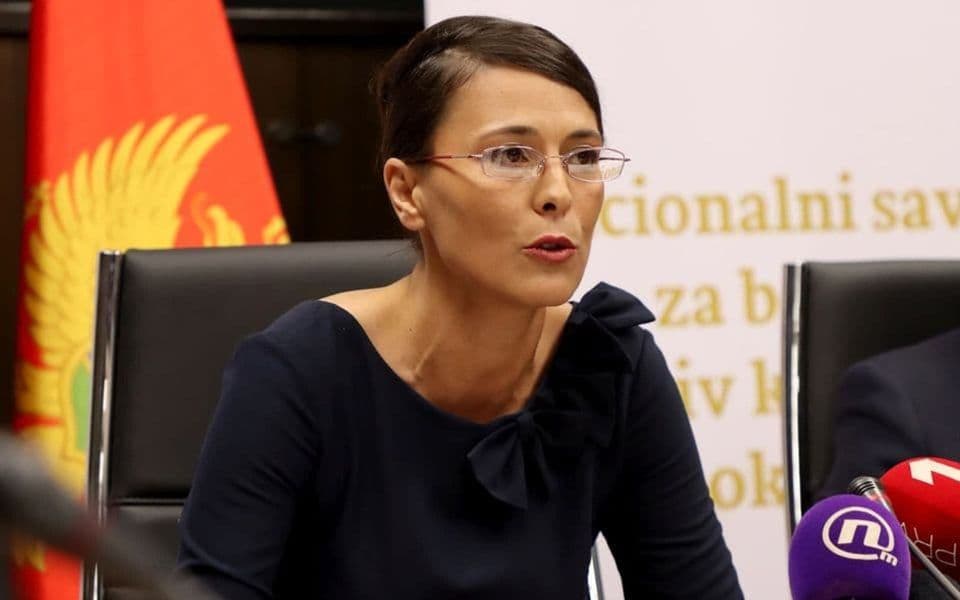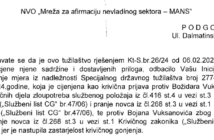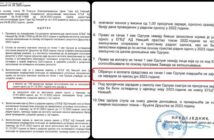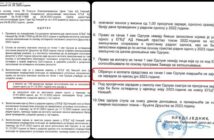Source: Pobjeda (Duško Mihailović)
Delaying of parliamentary procedures related to the election of judges of the Constitutional Court, especially in a situation where that judicial authority is dysfunctional, indicates that political parties are trying to gain some time in order to reach an agreement on the partitocratic tailoring of its structure, the Executive Director of the Network for Affirmation of NGO Sector (MANS), Vanja Ćalović-Marković, told Pobjeda.
 Vanja Ćalović Marković, Photo: Pobjeda/Dobrilo Malidžan
Vanja Ćalović Marković, Photo: Pobjeda/Dobrilo Malidžan
The Constitutional Committee of the Parliament has dragged out the hearings of 17 candidates for four judges of the Constitutional Court and determining of the list to be proposed to the plenum for almost a month. The interviewing of candidates began on the 13th and lasted until September 29, while the Board session at which the list of candidates should be determined is scheduled for Monday, October 10.
The fight for quotas
– Parties are fighting for quotas. Everyone is trying to insert one of their own, otherwise they would have elected at least one judge of the Constitutional Court in one of the previous stages. However, it is obvious that the parties cannot agree on that issue – whose representatives will essentially be elected and we will get another party-affiliated Constitutional Court – Ćalović-Marković told Pobjeda.
She points out that the public had the opportunity to hear the announcements that there are enough candidates to agree on four.
– I believe, and the public will have the opportunity to see for themselves, that if they agree on those four candidates, we will know exactly who is politically affiliated to which party, and these will essentially be quotas that allow certain political parties to influence the opinion of the Constitutional Court – she stated.
On the other hand, the Constitutional Committee, when it last interviewed candidates after one of the advertisements for judges of the Constitutional Court, interviewed seven of them within three days, from July 25 to 27.
Delay
When asked for her opinion on the delay in interviewing candidates after the latest advertisement, especially considering that most of them are the same ones who have already been interviewed in earlier procedures for previous competitions, Ćalović-Marković says that the parties have probably failed to reach an agreement.
– Bearing in mind that they were trying to find a solution by electing one judge, and that judge could never meet the interests of so many political entities, I assume that now they are somehow trying to find a solution that will please at least four political entities – she assessed.
According to her, the whole procedure was calculated and delayed precisely in order to reach some political agreements and compromises of a political nature.
– If it were an issue of the legal profession and science, everyone would make an effort to give high priority to hearing the candidates for judges of the Constitutional Court as soon as possible. And not only that, but to send a clear message to everyone in Montenegro who meets those criteria to apply. Instead, with their previous behavior, they have sent a message to those lawyers who could do that job properly that they have no reason to apply, because the parties will end up making political calculations – the Director of MANS stated.
Closed window
A few days ago, after the session of the National Security Council, Prime Minister Abazović called on the MPs to elect four judges of the Constitutional Court, explaining that there are now enough candidates, and stating that there are 19 of them.
However, two candidates have given up their candidacy in the meantime – Gorica Fatić and Edis Hadžić – so there is actually one candidate less than on July 28, when in the previous attempt to elect judges, MP of URA, Suada Zoronjić, abstained 18 times during the vote at the Constitutional Committee, by which she practically closed the “window” for obtaining final benchmarks and a positive progress report of Montenegro by the European Commission.
When asked what is her opinion on Abazović’s “call”, Ćalović-Marković assesses that it is an attempt to shift the burden of responsibility from himself and from the Government to the Parliament, primarily because of the international community, and to point to some other body that should resolve the political crisis.
– I think that regardless of such views, he cannot renounce his political responsibility for the actions of his party, which was obviously not ready to elect a judge of the Constitutional Court – Ćalović-Marković says.
She believes that this is Abazović’s message to seek solutions at the political level.
– It would not come as a surprise if negotiations were not only about the judges of the Constitutional Court, but also about some other important positions in the judiciary – specifically the Supreme State Prosecutor, while in relation to which party will get which seats, Abazović is now speaking up in order to somehow facilitate those agreements. I am once again sorry that this new majority did not even try to use the opportunity to build institutions, to find people of credibility, but instead, it is looking for servants who will make decisions as they dictate – the director of MANS says.
Progress report
Asked what kind of progress report she expects in light of the information that Montenegro has completely failed in the implementation of key elements for obtaining the final benchmarks, Ćalović-Marković says that she expects a very negative report from the EC.
– There are some efforts to try to find some way to see the light at the end of the tunnel, but as far as I can tell from my communications, it is going to be pretty negative. Because of some, let’s say, global-political issues, it may not be as negative as it would be in some other circumstances. I am primarily referring to the intention for Europe to freeze the enlargement process with Serbia because of its attitude towards Russia and the war in Ukraine. At least in that part, Montenegro and the current government have been in line with EU foreign policy. I think that is why, primarily, the EC is trying to find some space so that the report is not as negative as it realistically should be. Us who live in Montenegro know very well that there have been no reforms, except for political populism and spending money from the budget for the election purposes – Ćalović-Marković concluded.



